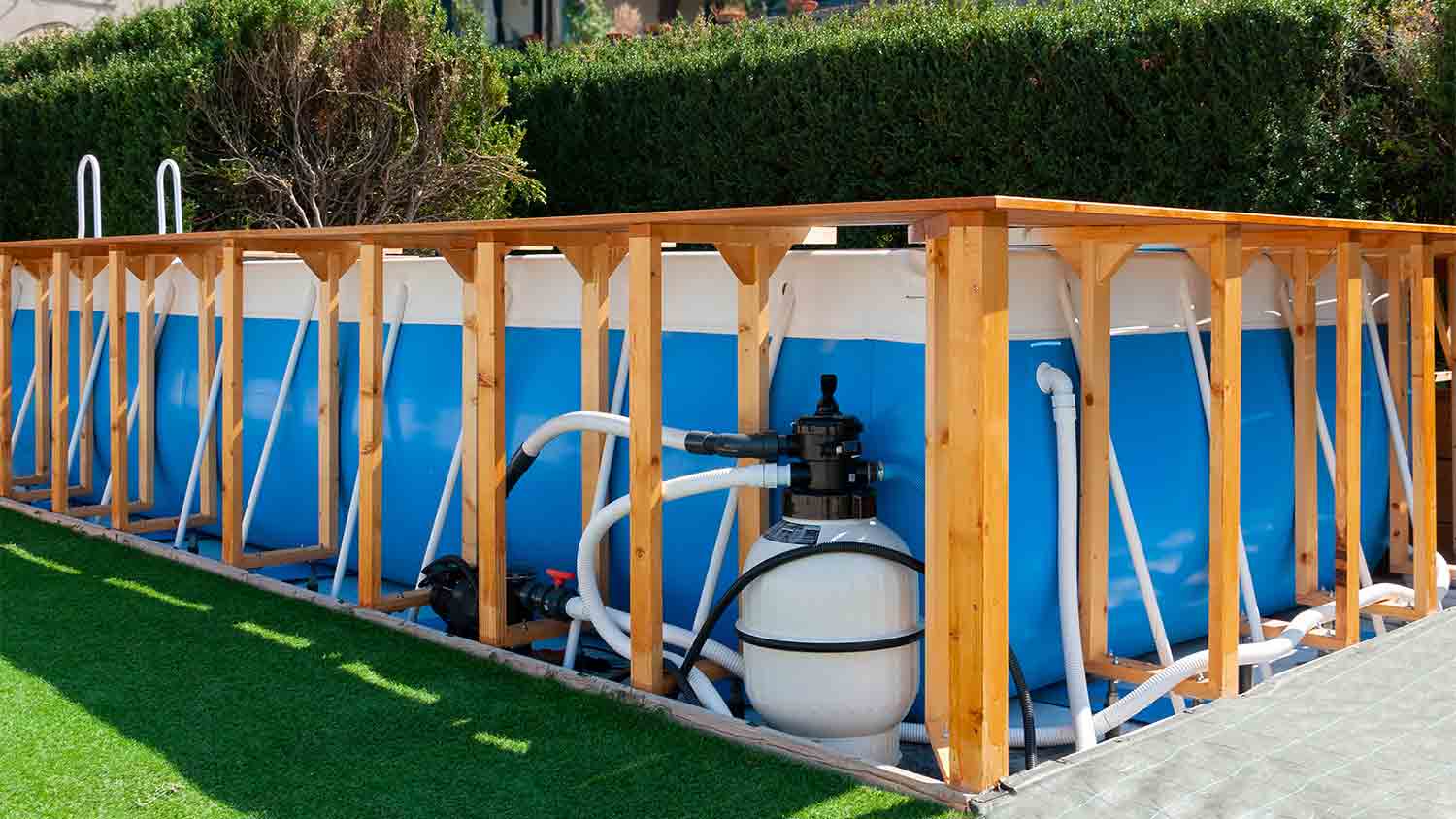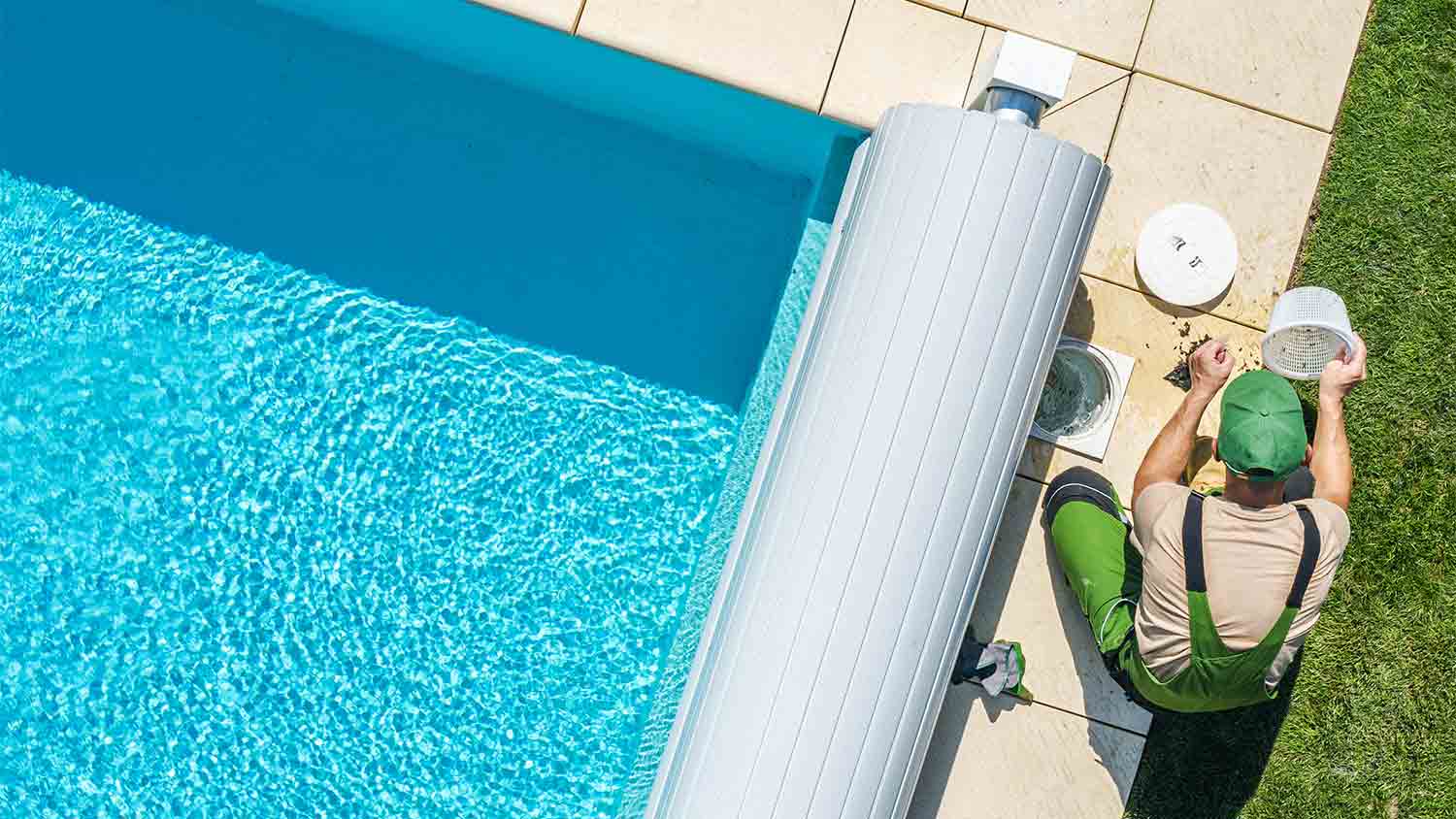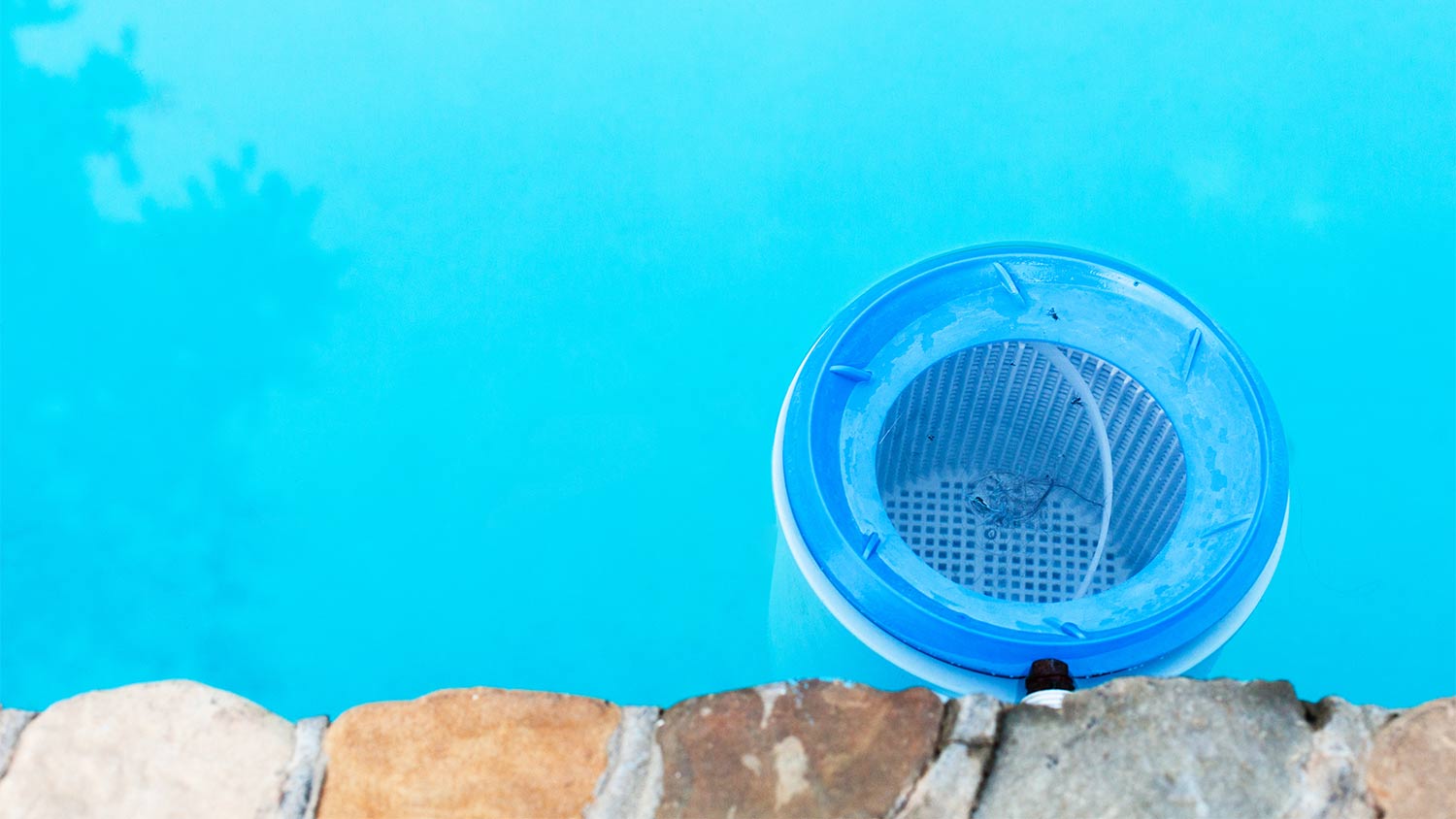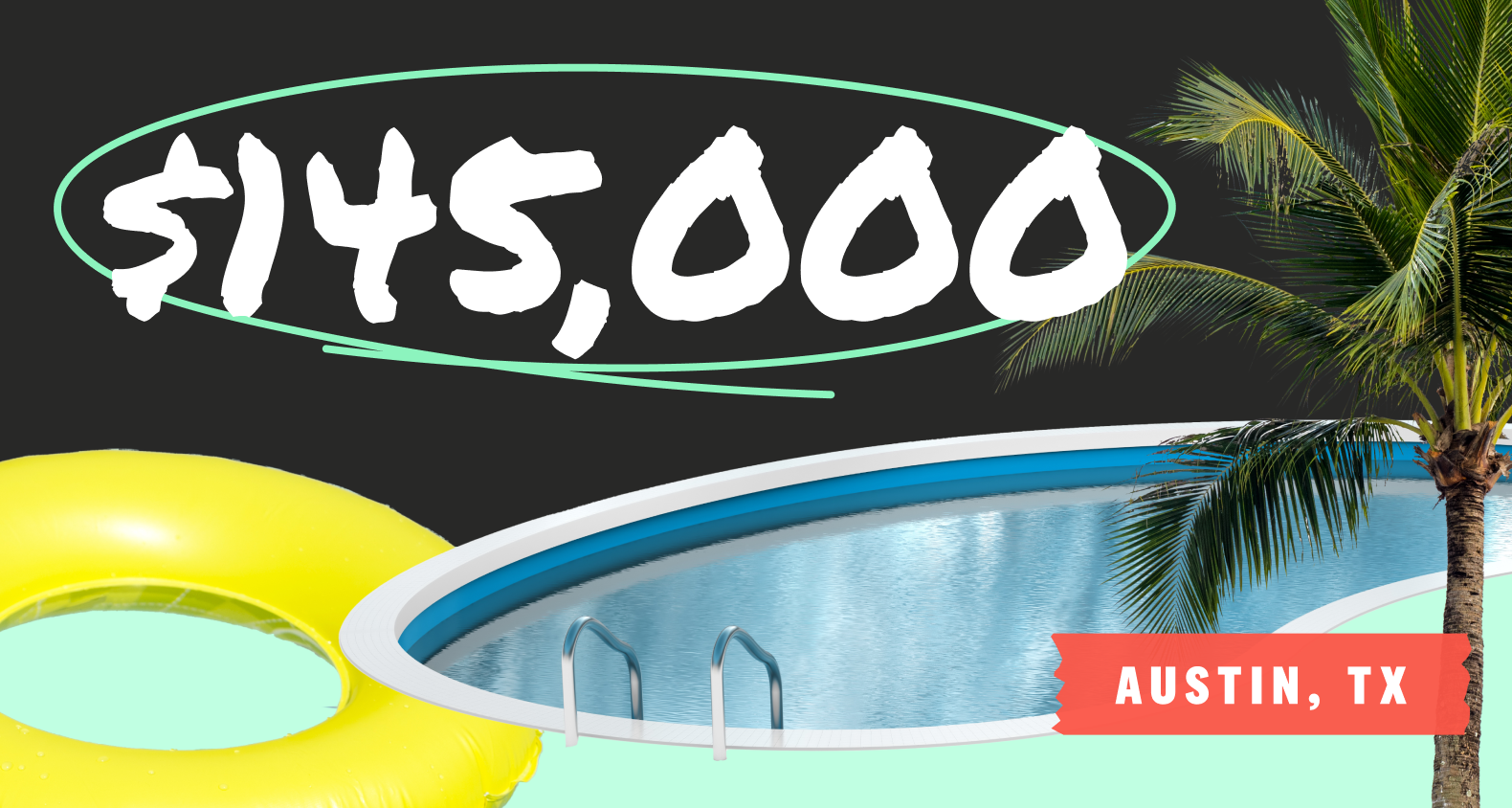How Much Does a Pool Filter Cost to Install or Replace in 2025?
A pool filter costs $250 to $2,000, with the average homeowner spending $1,125 on new pool filter installation. The type of filter is the largest cost factor.


Don’t try to save money by buying a filter that’s too small, as it can lead to other more costly issues.
Filters are labeled by how many contaminants they catch, so the lower the micron count the more expensive.
Some filters are machine washable, which may be more expensive up front but save you down the road.
If hiring a pro, opt for a pool tech who handles plumbing and electrical just in case.
The cost of pool filters ranges between $250 and $2,000, and this guide will help you figure out the best fit for you. Sparkling blue swimming pools don’t happen by accident—you have to put in the work to maintain your water. And when it comes to your pool equipment, nothing is arguably as important as your pool filter to keep contaminants out of your water.
Pool Filter Installation Cost Factors
Knowing how to choose the right pool filter saves time, but the number of choices can be overwhelming. Let’s break it down so you can get a better idea of what to expect.
Pool Type

While some equipment is compatible with all pools, filters are not. Make sure you get the right filter for your type of pool.
| Pool Type | Average Filter Cost |
|---|---|
| Aboveground | $250–$1,100 |
| In-ground | $250–$2,000 |
| Saltwater | $250–$2,000 |
Aboveground: Filters for aboveground pools cost $250 to $1,100. The filters cost less because these pools have smaller, simpler plumbing systems.
In-ground: These pools require bigger pumps and more efficient filters to keep the water clean. Installing or replacing in-ground pool filters costs $250 to $2,000.
Saltwater: You don’t need a special type of filter for saltwater pool maintenance. Expect to pay $250 to $2,000. If you're in the process of making the switch, converting to a saltwater pool costs between $500 and $2,500 on average.
Materials
Pool filter prices vary depending on the type and size. Most filters fall within the $250 to $2,000 range, although disposable pocket filters can run as little as $30. Otherwise, you can get cartridge filters for the low end of the price range, while diatomaceous earth (DE) filters will be on the high end.
Size
It’s important to get a large enough filter to work properly with your pump. If your filter’s too small, you’ll overwork your pump. Eventually, your pump motor may wear out sooner than it should, leading to costly projects like removing algae from your pool.
On the other hand, a filter that’s too large can work fine. It’ll cost more to buy a larger filter, so most people just get the size they need. However, a large filter may require less cleaning and extend the life span of your pump. The table below shows the recommended filter sizes for your pool by volume. Each type of filter is rated per square foot.
Sand Filter Size by Pool Volume
| Pool Volume (Gallons) | Sand Filter Size |
|---|---|
| 10,000–15,000 | 3 sq. ft. |
| 20,000–25,000 | 3.9 sq. ft. |
| 30,000–35,000 | 4.9 sq. ft. |
| 40,000–45,000 | 6.9 sq. ft. |
Cartridge Filter Size by Pool Volume
| Pool Volume (Gallons) | Cartridge Filter Size |
|---|---|
| 10,000–15,000 | 100–200 sq. ft. |
| 20,000–25,000 | 300–400 sq. ft. |
| 30,000–35,000 | 400–500 sq. ft. |
| 40,000–45,000 | 500+ sq. ft. |
DE Filter Size by Pool Volume
| Pool Volume (Gallons) | DE Filter Size |
|---|---|
| 10,000–15,000 | 36 sq. ft. |
| 20,000–25,000 | 48 sq. ft. |
| 30,000–35,000 | 60 sq. ft. |
| 40,000–45,000 | 72 sq. ft. |
Brand
You will encounter countless brands of pool filters on the market. Some of the most popular brands include Hayward, Pentair, and Intex, though popular big-box home stores feature a range of brands at different price points. If you work with a local pool team, they will also be able to recommend the best brand of pool filter for your pool type.
| Brand | Cost Range |
|---|---|
| Hayward | $300–$1,300 |
| Intex | $150–$500 |
| Pentair | $300–$1,500 |
| XTremePowerUS | $150–$700 |
| VEVOR | $100–$300 |
Labor
Labor for a pool filter replacement costs $110 to $140. These costs don’t include possible plumbing or electrical needs. A plumber costs $45 to $200 per hour, while an electrician charges $40 to $100 per hour.
There are pool techs that charge $75 to $100 per hour that may be able to handle all of your installation needs, including electrical and plumbing.
No time to maintain your pool? Most pool contractors offer seasonal maintenance. Talk to your pro about scheduling check-ups to keep your pool healthy.
Pool Filter Cost by Type

Your final pool filter cost depends largely on the type. Keep an eye on the microns of contaminants that the filter can capture—the smaller the microns, the more effective it is.
| Pool Filter Type | Microns |
|---|---|
| 15–20 | |
| Cartridge | 10 |
| Sand | 20 |
| Glass | 9 |
| DE | 3 |
Pocket Filter: Pocket filters are the most affordable at $30 to $100, and higher-end options are machine washable. The easy DIY install means you don’t have to pay for labor. These can filter out 15 to 20 microns but are less effective than cartridge, glass, or DE filters.
Pool Filter Cartridge: Cartridge filters are among the most common, cost $200 to $1,600, and last two to three years. They filter out debris as little as 10 microns, meaning they’re less effective than glass and DE filters.
Pool Sand Filter: Sand filters use #20 silica sand to filter out debris 20 microns or larger and cost $300 to $1,200. If you backwash the system weekly, the sand lasts three to five years, but Zeolite sand lasts five years. Filter glass filters debris 5 microns and larger and lasts three times longer than silica.
Glass Filter: Glass filters capture contaminants with a glass media with an electrical charge. They cost $500 to $1,500 and work on contaminants 9 microns or larger. Replace these every eight to 10 years and backwash them every three months.
Diatomaceous Earth (DE) Filters: These are the most effective because they capture contaminants as little as 3 microns. Expect to pay $520 to $2,000 for a DE filter that lasts 10 years.
Ongoing Pool Filter Costs
You may know what kind of filter you need, but keep these additional costs on your radar. From cleaning to maintenance, you can keep your filter in tip-top shape and lengthen its life span.
Pool Filter Cleaning
Pool filter cleaning is necessary whenever your pressure gauge reads 8 to 10 PSI above normal. It’s also a good idea to do regular cleaning every three to six months.
You may negotiate filter cleaning as part of your swimming pool maintenance cost or pay $60 to $65 for filter cleaning only. A deep clean of your filter runs $125.
Maintenance

If you prefer to outsource the maintenance work, sign up for a pool service maintenance package. These cost $1,800 annually and cover services like filter cleaning. Or you might be a DIYer who wants to take on basic filter maintenance, such as:
Pool Filter Gasket Replacement: All pool filters have a gasket for a proper seal, but they break down over time. Replacing a filter gasket is DIYable for $10 to $40, but a pro can also get it done.
Cartridge Filter: Monitor your pressure gauge filter and clean it if it’s 8 PSI above normal. Clean these filters two to three times a year and deep clean them one to two times a year. Spray the cartridge down with a hose or filter cleaner and soak it in diluted muriatic acid ($12) or a pool filter cleaning solution ($20).
Glass Filter: Clean the glass pieces weekly, or twice a week during the peak summer months, and backwash the filter every three months. You don’t need to replenish anything to keep the filter working.
DE Filter: Backwash DE filters monthly during swim season, but check local laws for special regulations. Add back 80% of the DE you need for a new filter. A 25-pound package of DE filter powder costs $30. Clean the grids every two to three years, and hire a pro for an intensive annual cleaning.
Sand Filter: Backwash sand filters weekly and replace the sand every three to five years. It costs $15 to $40 for a 50-pound bag of #20 silica sand. The amount of sand you need depends on the filter size (see the table below).
| Tank Diameter (Inches) | Sand Required (Pounds) | Cost |
|---|---|---|
| 16 | 100 | $30–$80 |
| 18 | 150 | $45–$120 |
| 19 | 175 | $60–$160 |
| 20 | 200 | $60–$160 |
| 22 | 250 | $75–$200 |
| 24 | 300 | $90–$240 |
| 27 | 350 | $105–$280 |
| 30 | 500 | $150–$400 |
| 36 | 700 | $210–$560 |
Service Fees
Most pool maintenance packages include pool filter maintenance for $95 to $260 per month. Your pool tech will clean your filter, including regular backwashing for sand, DE, and glass filters.
If you prefer DIY pool maintenance but want to call in a pool pro occasionally, expect to pay $60 to $125 per visit, depending on whether you need a basic or a deep clean.
Cost of Common Pool Filter Add-Ons

Pool filter replacement costs may be related to other pool problems. For example, clearing cloudy pool water might stem from a series of issues that your pool contractor can identify and resolve. Here are some add-ons to consider:
Pool Pump Replacement: You might need a pool pump replacement when you replace a filter. Depending on your pump type, expect to pay $500 to $2,820.
Skimmer Box Installation: The skimmer box, or skimmer basket, captures debris before it reaches the filter. Over time, your basket can crack or break, and a new skimmer box costs $5 to $35.
Pool Shock: Sometimes, you need to lower the pH in your pool or rebalance the chemicals in the water. Shocking a pool yourself costs $25 to $50, and pros charge $75 to $100 per hour.
Pool Vacuum: A broken filter can lead to leaves, bugs, and muck floating around in the water. Some pros offer pool vacuuming after replacing the filter at a flat or hourly rate, or you can vacuum the pool yourself.
Warranties: Investigate whether an extended warranty is worth it for a new pool filter or if it falls under your home warranty. Most warranties cover factory defects but not wear and tear. The coverage may only apply if you hire a pool contractor for the installation.
How Much Does Pool Filter Replacement Cost to Do Yourself?
If you want to take on a DIY job, the pool filter replacement cost will only be for the unit, which runs anywhere from $250 to $2,000. Replacing the filter is fairly simple if you have a pocket filter, but any other type will require some elbow grease.
And if you have a high-dollar pool filter, ensure you know what you’re doing—accidentally breaking your filter or damaging it during installation is a costly mistake you’ll want to avoid.
DIY Costs vs. Hiring a Pro
When you DIY the job, you save on labor costs, which are $110 to $140 for a like-for-like filter replacement. Plan to purchase replacement DE and sand filters. On the other hand, cartridge and glass filters only require a cleaning solution.
If you want to change your pool’s filter type, it’s best to hire a pool service near you to help with everything from removing the old filter to new electrical and plumbing updates.
How to Save on the Cost of a Pool Filter

One way you can save on pool filter costs is by bundling it with your pump installation. It can also ensure the two components work together and everything runs smoothly.
Secondly, you might consider investing up front in a longer-lasting filter. For example, a DE filter is more costly than a cartridge filter but lasts 10 years—whereas a cartridge filter is only good for two to three years.
How Angi Gets Its Cost Data
Home is the most important place on earth, which is why Angi has helped more than 150 million homeowners transform their houses into homes they adore. To help homeowners with their next project, Angi provides readers with the most accurate cost data and upholds strict editorial standards. We extensively research project costs to develop the pricing data you see, so you can make the best decisions for you and your home. We rely on reputable sources, including the U.S. Bureau of Labor Statistics, academic journals, market studies, and interviews with industry experts—all to ensure our prices reflect real-world projects.
Want to help us improve our cost data? Send us a recent project quote to costquotes@angi.com. Quotes and personal information will not be shared publicly.
Frequently Asked Questions
Your pool filter lasts anywhere from one to 10 years, depending on the filter type and whether it’s well-maintained. The easiest way to tell if your filter is nearing the end of its life span is when you start noticing that the PSI on the pressure gauge is inconsistent, water chemical levels are not stable, and you’re finding leaks.
The actual time you need to run your pump can vary depending on your pump type. But generally speaking, you should run your pool pump anywhere from eight to 10 hours a day. Making sure you run your pump for the proper amount of time helps keep your water clean and your chemical levels balanced.
If you don’t change your pool filter, you could end up with a big repair bill. A clogged filter can overwork your pump and lead to premature pump failure. It can also be caused cloudy water, algae growth, water pressure problems, and inconsistent chemical levels, potentially leading to eye and skin irritation, according to the CDC.





- Swimming Pool Installation
- Pool Liner Replace & Install Companies
- Above Ground Pool Contractors
- Pool Remodeling Companies
- Inground Pool Companies
- Pool Removal Companies
- Inground Pool Repair Companies
- Sauna Companies
- Hot Tub Companies
- Sauna Repair
- Fiberglass Pools
- Pool Designers
- Pool Pump Repair
- Pool Closing Services
- Solar Pool Heater Installers











